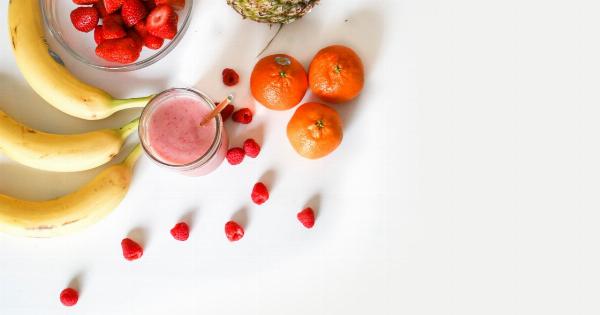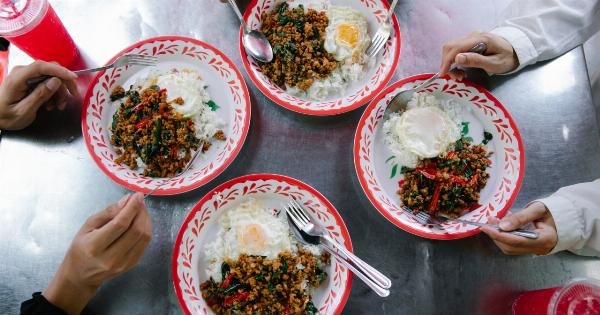Iron is an essential mineral that plays a crucial role in the body. It is responsible for the production of red blood cells, which carry oxygen to all parts of the body.
Iron also helps maintain healthy skin, hair, and nails, and supports proper brain function. However, iron deficiency is a common problem worldwide, particularly among women and children. If left untreated, it can lead to severe health complications.
The good news is that you can easily avoid iron deficiency by incorporating iron-rich foods into your diet. In this article, we will explore the best ways to ensure adequate iron intake and prevent deficiency.
Understanding Iron Deficiency
Iron deficiency occurs when the body doesn’t have enough iron to function properly. Without sufficient iron, the production of red blood cells decreases, leading to a condition called anemia.
Anemia can cause fatigue, weakness, shortness of breath, and impaired cognitive function. It can also weaken the immune system, making you more susceptible to infections. Women are at a higher risk of iron deficiency due to blood loss during menstruation, pregnancy, and lactation.
Additionally, infants, toddlers, and teenagers may be vulnerable to iron deficiency due to rapid growth. Vegetarians and vegans, who don’t consume animal products rich in heme iron, must pay special attention to their iron intake.
The Importance of Iron in the Body
Iron plays a vital role in carrying oxygen from the lungs to the rest of the body. It is a critical component of hemoglobin, a protein in red blood cells that binds oxygen and transports it to tissues and organs.
Iron also assists in the production of myoglobin, a protein that stores oxygen in muscles. Without sufficient iron, your body cannot adequately supply oxygen to its cells, resulting in fatigue, weakness, and poor recovery from physical exertion. Iron is also essential for maintaining healthy skin, hair, and nails.
It helps regulate body temperature, promotes brain function, and supports the immune system.
Different Types of Dietary Iron
There are two types of dietary iron: heme and non-heme iron.
Heme Iron
Heme iron is derived from animal sources, primarily meat, poultry, and fish. It is the most easily absorbed form of iron by the body. Heme iron is found in higher amounts in red meats such as beef, lamb, and liver.
It is also present in smaller quantities in poultry, such as chicken and turkey, and in fish, including salmon and sardines.
Non-Heme Iron
Non-heme iron is mainly obtained from plant sources. While non-heme iron is not as easily absorbed as heme iron, it can still contribute significantly to your iron intake.
Examples of non-heme iron-rich foods include legumes (such as lentils and beans), tofu, spinach, kale, broccoli, fortified breakfast cereals, and nuts.
Increase Your Iron Absorption
Even if you consume iron-rich foods, your body may not absorb all the iron present. However, certain dietary choices can enhance iron absorption.
Pair Iron-Rich Foods with Vitamin C
Vitamin C helps enhance the absorption of non-heme iron. Incorporating foods rich in vitamin C, such as citrus fruits, strawberries, bell peppers, and broccoli, with your iron-rich meals can significantly boost your iron absorption.
Avoid Consuming Calcium and Iron Together
Calcium can inhibit the absorption of both heme and non-heme iron. While calcium is important for bone health, it’s best to avoid consuming calcium-rich foods and iron-rich foods at the same time.
For example, if you’re eating a spinach salad (rich in non-heme iron), postpone drinking milk (rich in calcium) until a few hours later to allow for proper iron absorption.
Limit Coffee and Tea Consumption
Coffee, tea, and other caffeinated beverages contain compounds called tannins, which can interfere with the absorption of iron.
If you’re consuming iron-rich foods, it’s best to limit your intake of coffee and tea, especially around meal times. Choosing herbal teas or opting for decaffeinated versions can be a better option.
Include Fermented Foods in Your Diet
Fermented foods, such as yogurt, sauerkraut, and kimchi, contain beneficial bacteria that promote gut health. These bacteria enhance the absorption of nutrients, including iron.
Including fermented foods in your diet can potentially improve your iron absorption.
Iron-Rich Foods to Include in Your Diet
To ensure adequate iron intake and prevent deficiency, incorporate the following iron-rich foods into your diet:.
1. Lean Red Meat
Lean cuts of beef, lamb, and pork are excellent sources of heme iron. Enjoy a steak or include ground meat in your favorite recipes to boost your iron intake.
2. Poultry
Poultry, such as chicken and turkey, provides heme iron. Remove the skin and choose lean cuts for the healthiest option.
3. Fish and Seafood
Fatty fish like salmon, sardines, and trout not only provide heme iron but also offer omega-3 fatty acids, which promote heart health.
4. Legumes
Lentils, beans, and chickpeas are high in non-heme iron, fiber, and protein. Include them in soups, stews, salads, or as a meat substitute in various dishes.
5. Tofu
Tofu is an excellent plant-based source of iron, especially for vegetarians and vegans. Incorporate it into stir-fries, curries, or enjoy it grilled.
6. Spinach and Other Leafy Greens
Leafy greens are packed with nutrients, including non-heme iron. Enjoy spinach, kale, Swiss chard, or beet greens in salads, smoothies, or sautéed as a side dish.
7. Fortified Breakfast Cereals
Many breakfast cereals are fortified with essential nutrients, including iron. Check the labels to find cereals that provide a substantial amount of iron per serving.
8. Nuts and Seeds
Almonds, cashews, pumpkin seeds, and sesame seeds are rich in iron. Enjoy them as a snack, sprinkle them on salads, or use them in homemade granola.
Iron Supplements
If you are unable to meet your iron needs through your diet alone, your doctor may recommend iron supplements. It’s important to follow your healthcare provider’s advice, as excessive iron intake can also be harmful.
Iron supplements are available in various forms, such as ferrous sulfate, ferrous gluconate, and ferric citrate. They are most effective when taken on an empty stomach to enhance absorption. However, discuss the appropriate dosage and timing with your doctor, as some individuals may experience digestive discomfort or interactions with other medications.
Preventing Iron Deficiency in Specific Groups
Women
Women of childbearing age, especially those who experience heavy menstruation, have an increased risk of iron deficiency. It’s important for women to maintain a diet rich in iron-rich foods.
Pregnant and breastfeeding women have higher iron requirements and may require prenatal or postnatal supplements.
Children and Adolescents
Infants, toddlers, and teenagers also require higher amounts of iron due to growth spurts. Encouraging iron-rich foods and providing balanced meals and snacks is essential in preventing iron deficiency in these age groups.
Vegetarians and Vegans
Vegetarians and vegans need to pay special attention to their iron intake since plant-based sources of iron are less readily absorbed. Consuming good sources of non-heme iron, along with vitamin C-rich foods, can help enhance iron absorption.
Some individuals may benefit from an iron supplement, particularly if their iron levels are consistently low.
Conclusion
Iron deficiency is a common nutritional problem that can lead to anemia and other health complications. Incorporating iron-rich foods into your diet can help prevent iron deficiency and ensure optimal health.
Remember to include a variety of heme and non-heme iron sources, and make dietary choices that enhance iron absorption. If needed, consult with your healthcare provider to determine if iron supplements are necessary to meet your iron needs. By eating for iron, you’ll support your overall well-being and maintain optimal functioning of your body.































